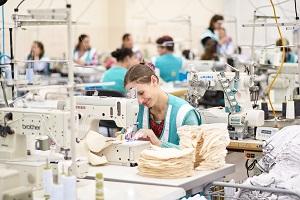At the informal virtual policy dialogue on fashion in Moldova hosted by the United Nations Economic Commission for Europe (UNECE) on 19 May 2021, members of the UN Alliance for Sustainable Fashion and stakeholders of the Moldovan fashion industry came together to discuss the potential of this sector to contribute to the country’s implementation of the 2030 Agenda for Sustainable Development.
H.E. Ms. Tatiana Molcean, Permanent Representative of Moldova to the United Nations Office in Geneva, pointed out that there are many opportunities for making Moldova’s textile, apparel, footwear and leather goods sector more sustainable, inclusive and fairer. For example, easing the access of women in rural areas to this job market could lead to better employment opportunities, and by implementing measures to decrease its carbon footprint, the fashion industry could make itself more competitive globally.
Fashion and textiles are a major component of the Moldovan economy, generating nearly 22 per cent of the country’s total export volume in 2018. Over 26,000 mostly female workers are employed by around 450 enterprises, of which the majority is small and medium-sized. Many well-known fashion brands, produce their garments in Moldova. Some 82 per cent of the merchandise is exported to EU markets, while the rest is consumed domestically.
Some of the challenges currently facing the sector include:
- Limited application of the e-commerce legislation and lack of adjusted tax and customs policies to promote sustainability;
- Difficulties navigating and complying with social and environmental standards necessary for the European markets;
- Limited marketing and branding strategies for reaching new markets.
Representatives from the International Trade Centre, the UN Environment Programme, the UN Conference on Trade and Development, the International Labour Organization and the UN Industrial Development Organization offered recommendations on how to tackle these challenges, especially in the light of the impacts that COVID-19 had on the fashion industry globally.
International brands will increasingly explore nearshoring to bring flexibility and autonomy to their production facilities and satisfy the demand for products made close to home. There are thus opportunities for the Moldovan fashion industry to leverage new manufacturing hubs and promote digitalization, experts concluded. In order to further raise the competitiveness of the sector and comply with industry targets for low-carbon supply chains, advancing the decarbonization of the sector by promoting renewable energy and efficiency in textile manufacturing is a key opportunity for Moldova. UN Alliance members signalled their readiness to apply lessons learned and best practices to support Moldova on its sustainable fashion journey.
“The informal policy dialogue on sustainable fashion in Moldova is a clear sign that the UN Alliance on Sustainable Fashion is an effective mechanism to coordinate action and responses to the challenges of the fashion industry. Today it was clear how each organization that forms part of the UN Alliance has specific strengths and tools that can be of the service to countries; the fact action is coordinated under the Alliance leads to synergies and avoids overlaps“ said Ms. Paola Deda, Director at UNECE and founding member and focal point for UNECE of the UN Alliance on Sustainable Fashion.
Note to editors:
The United Nations Alliance for Sustainable Fashion is an initiative of United Nations agencies and allied organizations designed to contribute to the Sustainable Development Goals through coordinated action in the fashion sector. Specifically, the Alliance works to support coordination between UN bodies working in fashion and promoting projects and policies that ensure that the fashion value chain contributes to the achievement of the Sustainable Development Goals’ targets.
Fashion, as understood by the Alliance, includes clothing, leather and footwear, made from textiles and related goods. The scope of the Alliance’s work extends from the production of raw materials and the manufacturing of garments, accessories and footwear, to their distribution, consumption, and disposal.
Sustainability encompasses social issues, such as improvements in working conditions and remuneration for workers, as well as environmental ones, including the reduction of the industry’s waste stream, and decreases in water pollution and contributions to greenhouse gas emissions.
Through the Alliance, the UN commits to changing the path of fashion, reducing its negative environmental and social impacts; and turning fashion into a driver of the implementation of the Sustainable Development Goals. For more information, visit: https://unfashionalliance.org/


